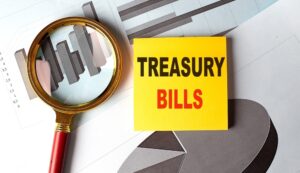Introduction to Treasury Bills in Nigeria
Nigerian Treasury Bills (T-Bills) can be the best option for you if you’re searching for a simple and secure strategy to increase your money. Compared to many other investing options, Treasury bills are less risky since they are government-backed securities. T-Bills offer stability and steady returns, making them a great way for novices to get started in the world of investing.
In Nigeria, T-Bills let you make short-term loans to the government, usually for a few months to a year. You receive interest in exchange, which is paid up front, and your principle is reimbursed when the loan matures. Because of this, T-Bills are well-liked by investors who want to make cautious investments without making long-term commitments. Everything you need to know about investing in Nigerian Treasury notes for novices will be covered in this article.
What Are Treasury Bills and How Do They Work in Nigeria?
The Central Bank of Nigeria (CBN) issues Treasury Bills, which are short-term debt instruments, on behalf of the federal government. Consider them as little loans to the government from people, companies, and organisations.
In exchange, investors get interest on the principal—the initial investment—at a rate set by the state of the market and governmental regulations. 91, 182, and 364 days are the usual possibilities for the tenure, or period, of Nigerian Treasury Bills.
Depending on your financial objectives and investing schedule, you can select a tenure. For instance, the 364-day option delivers a little greater return over a year, while the 91-day T-Bill is best for extremely short-term investments.
Why invest in Treasury bills in Nigeria?
There are a number of advantages to purchasing Treasury bills, particularly for conservative investors. Compared to stocks or other investment choices, T-Bills are less risky since they are backed by the Nigerian government. Here are some explanations for why T-Bills might be a wise decision:
- Low Risk: Treasury bills are considered “risk-free” investments because they are fully backed by the government. This is reassuring for anyone who wants to protect their principal investment.
- Liquidity: T-Bills are relatively liquid, which means you can easily sell them on the secondary market if you need access to your money before the maturity date.
- Predictable Returns: With T-Bills, you know your rate of return upfront. This makes it easier to plan your finances and set realistic goals.
For beginner investors in Nigeria, T-Bills offer an accessible way to build wealth gradually. With options for different tenures and competitive interest rates, Nigerian Treasury bills can be a great addition to any conservative investment portfolio.
How to Invest in Treasury Bills for Beginners in Nigeria
Ready to get started? Here’s a step-by-step guide on how to invest in Treasury bills for beginners in Nigeria:
- Open an Account: First, open an investment account with your chosen bank, stockbroker, or asset management company, such as DLM Asset Management. You’ll need to complete the necessary KYC (Know Your Customer) documentation.
- Deposit Funds: Once your account is set up, deposit the amount you want to invest. Keep in mind that some institutions may have minimum investment requirements.
- Place a Bid: Treasury bills in Nigeria are auctioned by the CBN. When you place a bid, you’ll specify the amount you want to invest and the rate you’re hoping to get. Your bid can be “competitive” (meaning you specify the rate) or “non-competitive” (you accept whatever rate is set by the auction).
- Wait for Allocation: After the auction, the CBN will allocate T-Bills to bidders. If your bid is accepted, you’ll receive your interest payment upfront, and the T-Bill will be added to your account.
- Hold to Maturity or Sell Early: You can hold your T-Bill until it matures, at which point the government will repay your initial investment amount. If you need the funds sooner, you can sell your T-Bill on the secondary market, though this may affect your overall return.
Minimum Investment Amount for Treasury Bills in Nigeria
The minimum amount you can invest in a Treasury Bill (T-Bill) in Nigeria depends on the method of purchase.
- Primary market
The minimum investment is ₦50,001,000. Investors can buy T-Bills directly from the Central Bank of Nigeria (CBN) during the primary market auction, which takes place every two weeks on Wednesdays.
- Secondary market
The minimum investment is ₦100,000, and subsequent investments must be in multiples of ₦10,000. Investors can buy T-Bills through authorised dealers, such as banks, stockbrokers, and discount houses.
- Commercial banks
Some banks allow investors to invest as little as ₦1,000,000. These banks pool money from multiple customers to meet or exceed the ₦50 million requirement and then invest on behalf of their customers.
For the latest rates, contact DLM Asset Management. We give real-time information on current T-Bill rates and advise you on the ideal time to invest. Keep in mind that rates for longer durations, such as the 364-day bill, are usually higher than for shorter terms, such as the 91-day bill. Investing in T-Bills with an understanding of the prevailing rates can help you maximise your returns while staying aligned with your financial goals.
Access to flexible choices that are suited to your budget may also be obtained by working with asset managers such as DLM Asset Management.
Where to Buy Treasury Bills in Nigeria
To buy Treasury bills in Nigeria, you’ll need to go through a licensed financial institution. Banks, stockbrokers, and some asset management firms, like DLM Asset Management, are authorised to facilitate T-Bill purchases. Here’s a closer look at your options:
- DLM Asset Management: DLM Asset Management is a reputable asset management company that specialises in helping individuals invest in Treasury bills. Working with a company like DLM Asset Management can be particularly beneficial if you want expert advice on timing your investment to get the best rates.
- Stockbrokers: Registered stockbroking firms also provide access to Treasury bills, often with options for buying on both the primary and secondary markets.
- Commercial Banks: Many Nigerian banks offer Treasury bills as part of their investment services. You can open an investment account at your bank and place your bid for T-Bills through them.
Treasury Bills Maturity Dates and Returns
The typical maturity dates of Nigerian Treasury bills are 91, 182, and 364 days. Your cash flow requirements and investment objectives will determine the maturity period you choose. For example, the 364-day T-Bill would be more appropriate if you’re hoping for a larger return over a longer time frame, while the 91-day T-Bill might be perfect if you’re trying to invest for a short time.
The CBN reimburses your principal amount when it matures. You may be confident that the procedure will go smoothly if you’ve selected a respectable organisation, such as DLM Asset Management.
Risks and Considerations
While Treasury bills are low-risk, it’s essential to understand the factors that could affect your returns:
- Interest Rate Risk: T-Bill rates are affected by the broader economy. If rates drop significantly after your investment, newer T-Bills may have lower yields, impacting your reinvestment options.
- Inflation: High inflation can erode the purchasing power of your returns. Make sure to consider inflation when setting your financial goals.
Investing in T-Bills is generally safe, but a careful approach can ensure your money grows in line with your needs.
FAQ Section
What is the minimum amount to invest in Treasury bills in Nigeria?
The minimum amount is usually around ₦10,000, though it may vary by institution or on the secondary market.
What are the Nigerian Treasury Bill rates?
Rates range based on tenure and market conditions. Recent rates have hovered around 6-12%. DLM Asset Management can provide flexible rates. Contact us, lets discuss
Can I buy Treasury bills in Nigeria as an individual?
Yes. Individuals can invest by opening an account with a bank, broker, or asset manager like DLM Asset Management.
How do I receive my returns from Treasury Bills?
Upon maturity, you receive the face value of the T-Bill. Interest is typically paid upfront.
What is the process for investing in Treasury bills in Nigeria?
It involves opening an account, funding it, placing a bid, and receiving allocation.
Conclusion
Investing in Treasury bills in Nigeria is a great starting point for anyone looking for a secure investment option. With minimal risk, predictable returns, and various tenures, T-Bills offer a flexible way to grow your wealth. Institutions like DLM Asset Management can provide personalised support throughout the process, helping you make the most of your investment journey. Start investing today.

